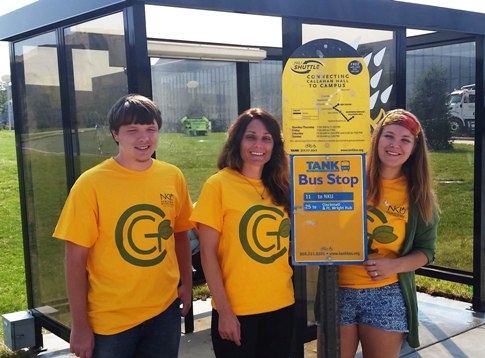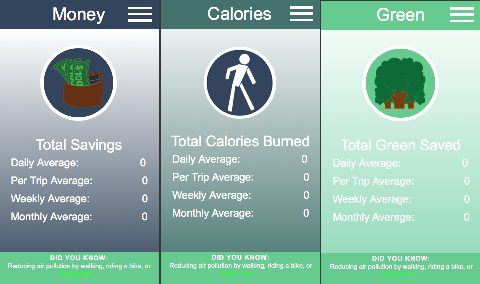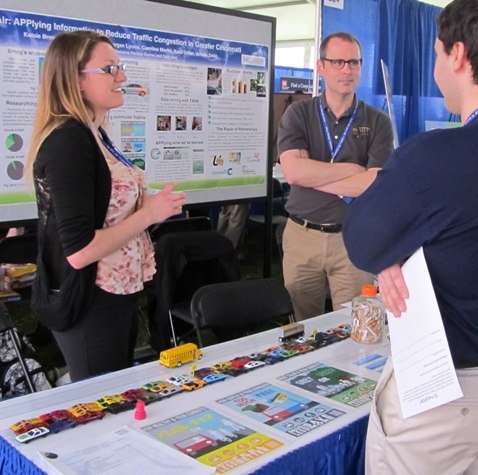Submitted by Chris Curran, Ohio Valley SOT Regional Chapter and Northern Kentucky University
Warning: If you don’t like alliteration, this blog will be difficult to follow! First, I need to explain the P3 program: People, Prosperity, and the Planet. The US Environmental Protection Agency (EPA) provides funding to support student-faculty teams at universities across the country that design novel, low-cost solutions to some of the world’s worst pollution problems. Teams receiving Phase I funding develop their prototypes and then compete at the national Sustainability Expo for Phase II funding to complete or expand their projects. Some past winners have even gone on to create new companies. P3 turned out to be the perfect program to promote pollution prevention.

P3 team members Jesse Hockenbury, Morgan Lyons, and Kelsie Brown promote increased transit use by encouraging fellow Northern Kentucky University students, faculty, and staff to "Choose Green!" and ride TANK buses.
Okay. Enough with the Ps. It’s on to the Ts! As the Ohio Valley SOT Regional Chapter K-12 liaison, I spent several years working with educators to develop lessons plans that could effectively communicate key concepts in toxicology to students from preschool to high school. The result was the Totally Toxic! program that has now been presented to hundreds of students in our region and at the national SOT Annual Meeting in 2011 and 2013. The next “T” is transdisciplinarity. At Northern Kentucky University (NKU), we have embraced the idea that the world’s biggest problems can never be solved by staying inside the silos of our own disciplines. So, we’re strongly encouraged to reach out to collaborators in other departments and colleges. Just like the sun uses fusion to power our solar system, transdisciplinarity fuses creativity and innovation across disciplines to create something new, exciting, and extremely powerful.
Together, the NKU P3 team included faculty and students in graphic design, computer science, public relations, environmental science, and communication studies. Together, we tackled a persistent problem in the Ohio Valley: traffic-related air pollution (TRAP). Our environmental science students dug through the scientific literature to learn all they could about the effects of TRAP, the economics of commuter choices, and the benefits of choosing green transportation choices. But that wasn’t enough. We needed the artistic creativity and communications savvy of our other team members to develop messages and strategies to change commuter behavior. Add in the computer science app development team, and we ended up with a ready-to-launch communications plan and a prototype smart phone app that quickly and clearly helps people make smart commuting choices.

There were three simple messages. How costly is your commute? How green is your commute? How healthy is your commute? The communications and graphic design team members took the information from the environmental science students and crafted flyers, app images, and a website that clearly translated the difficult-to-digest numbers into something easily understandable. They translated toxicology for the general public by showing how burning just one gallon of gasoline is the equivalent of burning hundreds of cigarettes. We even had a traffic trivia game. With the touch of an icon, smart phone app users could learn how much money they could save, how many calories they could burn, or how much carbon dioxide they were saving depending on which reward was most motivating to them personally.

NKU P3 team members demonstrate their smart phone app at the EPA 2015 Sustainability Expo held in Alexandria, Virginia, and explain how traffic-related air pollution can affect public health
Was that one powerful fusion of talent? Absolutely! In addition to earning Honorable Mention at the P3 competition in Alexandria, Virginia, last April (a huge feat considering our undergraduates were competing against many graduate students in engineering and environmental science), the team launched a crowdfunding campaign this fall to keep the project moving forward and earned an NKU University Research Council grant as well. But the real success can be summed up by the response of a visitor to our P3 booth in Alexandria. After listening to the students and viewing our display that clearly showed the benefits of making wise and green transportation choices, a woman dragged her husband over and said: “Look at this! You are taking the TRAIN on Monday!” Additional information is found at Green App Earns NKU National Recognition.